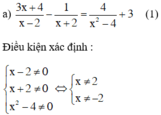Giải phương trình:
4x2+3x-4=\(\sqrt{x^2-2}\)
Hãy nhập câu hỏi của bạn vào đây, nếu là tài khoản VIP, bạn sẽ được ưu tiên trả lời.


\(\sqrt{x+1}-4x^2=\sqrt{3x}-1\left(x\ge0\right)\left(1\right)\)
\(\Leftrightarrow-4x^2+1+\sqrt{x+1}-\dfrac{\sqrt{6}}{2}=\sqrt{3x}-\dfrac{\sqrt{6}}{2}\)
\(\Leftrightarrow-\left(2x-1\right)\left(2x+1\right)+\dfrac{x+1-\dfrac{3}{2}}{\sqrt{x+1}+\dfrac{\sqrt{6}}{2}}=\dfrac{3x-\dfrac{3}{2}}{\sqrt{3x}+\dfrac{\sqrt{6}}{2}}\)
\(\Leftrightarrow-4\left(x-\dfrac{1}{2}\right)\left(x+\dfrac{1}{2}\right)+\dfrac{x-\dfrac{1}{2}}{\sqrt{x+1}+\dfrac{\sqrt{6}}{2}}-\dfrac{3\left(x-\dfrac{1}{2}\right)}{\sqrt{3x}+\dfrac{\sqrt{6}}{2}}=0\)
\(\Leftrightarrow\left(x-\dfrac{1}{2}\right)\left[-4\left(x+\dfrac{1}{2}\right)+\dfrac{1}{\sqrt{x+1}+\dfrac{\sqrt{6}}{2}}-\dfrac{3}{\sqrt{3x}+\dfrac{\sqrt{6}}{2}}\right]=0\)
\(\Leftrightarrow\left[{}\begin{matrix}x=\dfrac{1}{2}\left(tm\right)\\-4\left(x+\dfrac{1}{2}\right)+\dfrac{1}{\sqrt{x+1}+\dfrac{\sqrt{6}}{2}}-\dfrac{3}{\sqrt{3x}+\dfrac{\sqrt{6}}{2}}=0\left(2\right)\end{matrix}\right.\)
\(\left(x\ge0\right)\Rightarrow\left(2\right)< 0\Rightarrow\left(2\right)vô\) \(nghiệm\)
\(\Rightarrow S=\left\{\dfrac{1}{2}\right\}\)
\(\)

a:=>6x^2-8x+4x-6x^2<-4
=>-4x<-4
=>x>1
b: =>6x+8x^2-8x^2-24x>5
=>-18x>5
=>x<-5/18

a)\(6x^2-8x+2x\left(2-3x\right)< -4\)
\(\Leftrightarrow6x^2-8x+4x-6x^2< -4\)
\(\Leftrightarrow-4x< -4\)
\(\Leftrightarrow-4x.\dfrac{-1}{4}>-4\cdot\dfrac{-1}{4}\)
\(\Leftrightarrow x>1\)
Vậy bất phương trình có nghiệm là \(S=\left\{xIx>1\right\}\)
b)\(2\left(3x+4x^2\right)-8x\left(x+3\right)>5\)
\(\Leftrightarrow6x+8x^2-8x^2-24x>5\)
\(\Leftrightarrow-18x>5\)
\(\Leftrightarrow-18x\cdot\dfrac{-1}{18}< 5\cdot\dfrac{-1}{18}\)
\(\Leftrightarrow x< -\dfrac{5}{18}\)
Vậy bất phương trình có nghiệm là \(S=\left\{xIx< -\dfrac{5}{18}\right\}\)

a) 2(x + 3)(x – 4) = (2x – 1)(x + 2) – 27
⇔ 2(x2 – 4x + 3x – 12) = 2x2 + 4x – x – 2 – 27
⇔ 2x2 – 2x – 24 = 2x2 + 3x – 29
⇔ -2x – 3x = 24 – 29
⇔ - 5x = - 5 ⇔ x = -5/-5 ⇔ x = 1
Tập nghiệm của phương trình : S = {1}
b) x2 – 4 – (x + 5)(2 – x) = 0
⇔ x2 – 4 + (x + 5)(x – 2) = 0 ⇔ (x – 2)(x + 2 + x + 5) = 0
⇔ (x – 2)(2x + 7) = 0 ⇔ x – 2 = 0 hoặc 2x + 7 = 0
⇔ x = 2 hoặc x = -7/2
Tập nghiệm của phương trình: S = {2; -7/2 }
c) ĐKXĐ : x – 2 ≠ 0 và x + 2 ≠ 0 (khi đó : x2 – 4 = (x – 2)(x + 2) ≠ 0)
⇔ x ≠ 2 và x ≠ -2
Quy đồng mẫu thức hai vế :

Khử mẫu, ta được : x2 + 4x + 4 – x2 + 4x – 4 = 4
⇔ 8x = 4 ⇔ x = 1/2( thỏa mãn ĐKXĐ)
Tập nghiệm của phương trình : S = {1/2}
d) ĐKXĐ : x – 1 ≠ 0 và x + 3 ≠ 0 (khi đó : x2 + 2x – 3 = (x – 1)(x + 3) ≠ 0)
⇔ x ≠ 1 và x ≠ -3
Quy đồng mẫu thức hai vế :

![]()
Khử mẫu, ta được : x2 + 3x + x + 3 – x2 + x – 2x + 2 + 4 = 0
⇔ 3x = -9 ⇔ x = -3 (không thỏa mãn ĐKXĐ)
Tập nghiệm của phương trình : S = ∅
\(2\left(x+3\right)\left(x-4\right)=\left(2x-1\right)\left(x+2\right)-27\)
\(< =>2\left(x^2-x-12\right)=2x^2+3x-2-27\)
\(< =>2x^2-2x-24=2x^2+3x-2-27\)
\(< =>5x=-24+29=5\)
\(< =>x=\frac{5}{5}=1\)

ĐKXĐ: x>=-1
\(4x^2-2\sqrt{x+1}=x+2\)
=>\(4x^2-2\sqrt{x+1}-x-2=0\)
=>\(4x^2+3x-4x-3+1-2\sqrt{x+1}=0\)
=>\(\left(4x+3\right)\left(x-1\right)+1-\sqrt{4x+4}=0\)
=>\(\left(4x+3\right)\left(x-1\right)+\dfrac{1-4x-4}{1+\sqrt{4x+4}}=0\)
=>\(\left(4x+3\right)\left(x-1\right)-\dfrac{4x+3}{1+\sqrt{4x+4}}=0\)
=>\(\left(4x+3\right)\left(x-1-\dfrac{1}{1+\sqrt{4x+4}}\right)=0\)
=>4x+3=0
=>x=-3/4(nhận)


Quy đồng và bỏ mẫu chung ta được:
Phương trình (1) ⇔ (3x + 4)(x + 2) – (x – 2) = 4 + 3(x2 – 4)
⇔ 3x2 + 6x + 4x + 8 – x + 2 = 4 + 3x2 – 12
⇔ 9x = –18
⇔ x = –2 (không thỏa mãn đkxđ)
Vậy phương trình vô nghiệm.

1: \(\Leftrightarrow\left(x-3\right)\left(x+3\right)-\left(x-3\right)\left(5x+2\right)=0\)
\(\Leftrightarrow\left(x-3\right)\left(-4x+1\right)=0\)
hay \(x\in\left\{3;\dfrac{1}{4}\right\}\)
2: \(\Leftrightarrow\left(x-1\right)\left(x^2+x+1\right)-\left(x-1\right)\left(x^2-2x+16\right)=0\)
\(\Leftrightarrow\left(x-1\right)\left(x^2+x+1-x^2+2x-16\right)=0\)
\(\Leftrightarrow\left(x-1\right)\left(3x-15\right)=0\)
hay \(x\in\left\{1;5\right\}\)
3: \(\Leftrightarrow\left(x-1\right)\left(4x^2-1\right)=0\)
\(\Leftrightarrow\left(x-1\right)\left(2x-1\right)\left(2x+1\right)=0\)
hay \(x\in\left\{1;\dfrac{1}{2};-\dfrac{1}{2}\right\}\)
4: \(\Leftrightarrow x^2\left(x+4\right)-9\left(x+4\right)=0\)
\(\Leftrightarrow\left(x+4\right)\left(x-3\right)\left(x+3\right)=0\)
hay \(x\in\left\{-4;3;-3\right\}\)
5: \(\Leftrightarrow\left[{}\begin{matrix}3x+5=x-1\\3x+5=1-x\end{matrix}\right.\Leftrightarrow\left[{}\begin{matrix}2x=-6\\4x=-4\end{matrix}\right.\Leftrightarrow\left[{}\begin{matrix}x=-3\\x=-1\end{matrix}\right.\)
6: \(\Leftrightarrow\left(6x+3\right)^2-\left(2x-10\right)^2=0\)
\(\Leftrightarrow\left(6x+3-2x+10\right)\left(6x+3+2x-10\right)=0\)
\(\Leftrightarrow\left(4x+13\right)\left(8x-7\right)=0\)
hay \(x\in\left\{-\dfrac{13}{4};\dfrac{7}{8}\right\}\)
1.
\(\Leftrightarrow\left(x-3\right)\left(x+3\right)=\left(x-3\right)\left(5x-2\right)\)
\(\Leftrightarrow x+3=5x-2\)
\(\Leftrightarrow4x=5\Leftrightarrow x=\dfrac{5}{4}\)
2.
\(\Leftrightarrow\left(x-1\right)\left(x^2+x+1\right)=\left(x-1\right)\left(x^2-2x+16\right)\)
\(\Leftrightarrow x^2+x+1=x^2-2x+16\)
\(\Leftrightarrow3x=15\Leftrightarrow x=5\)
3.
\(\Leftrightarrow4x^2\left(x-1\right)-\left(x-1\right)=0\)
\(\Leftrightarrow\left(x-1\right)\left(4x^2-1\right)=0\)
\(\Leftrightarrow\left[{}\begin{matrix}x=1\\x=\dfrac{1}{2};x=-\dfrac{1}{2}\end{matrix}\right.\)
Ko chắc đou:( Nhất là cái đk ý, phải xét đủ thứ cái ... nào là VT>=0 với bt trong căn >=0.. ko biết có nhầm lẫn hay ko nx!
ĐK: \(x\ge\sqrt{2}\)
PT <=> \(4x^2+3x-\frac{9}{2}=\sqrt{x^2-2}-\frac{1}{2}\)
\(\Leftrightarrow\left(4x-3\right)\left(x+\frac{3}{2}\right)=\frac{x^2-\left(\frac{3}{2}\right)^2}{\sqrt{x^2-2}+\frac{1}{2}}\)
\(\Leftrightarrow\left(x+\frac{3}{2}\right)\left(4x-3-\frac{x-\frac{3}{2}}{\sqrt{x^2-2}+\frac{1}{2}}\right)=0\)
Giải cái ngoặc to: \(4x-3-\frac{2x-3}{2\sqrt{x^2-2}+1}=0\Leftrightarrow\left(8x-6\right)\sqrt{x^2-2}+2x=0\)
Dễ thấy VT >0 với mọi \(x\ge\sqrt{2}\) do vậy cái ngoặc to vô nghiệm.
\(\Rightarrow x=-\frac{3}{2}\)